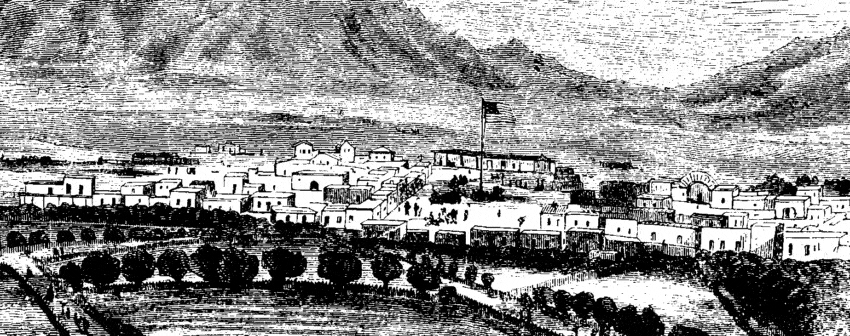May 4, 1862 – May 17, 1862
By Phil Kohn
Phil Kohn can be reached at USCW160@yahoo.com.
On May 4, 1862, Yorktown, on the Virginia Peninsula, falls to the Union Army. In Confederate Arizona, Capt. Sherod Hunter’s 75 or so Arizona Rangers — with some 2,350 Union troops from California approaching and no chance of receiving reinforcements — withdraw eastward from Tucson. Brig. Gen. Henry Sibley, commander of the ill-fated Confederate invasion of New Mexico, arrives at Fort Bliss, in Franklin, Texas, well ahead of his troops.
The next day, May 5, after serious fighting with retreating Confederates, the Federal Army of the Potomac takes over Williamsburg, Virginia. In the West, a foraging party from Hunter’s company of Arizona Rangers at Tucson is attacked while camped near Dragoon Springs, Confederate Arizona, by around 100 Chiricahua Apaches — led by their chief, Cochise. The Arizonans suffer four killed, with 20 horses and 35 mules run off. (The Chiricahuas — as well as the Mimbreño Apaches, led by Cochise’s father-in-law, Mangas Coloradas — have been on the warpath since an attempt in January 1861 by U.S. soldiers to capture Cochise, wrongly accusing him of kidnapping a young boy from a nearby ranch. From that time on, both groups attack with ferocity any outsiders that they catch in Apache Pass on their lands in the Dos Cabezas and Chiricahua Mountains, about 70 miles east of Tucson.)
On May 6, Maj. Gen. Halleck’s approach towards Corinth, Mississippi, decelerates from an advance to becoming more of a siege before the town.
From Tucson, Capt. Hunter dispatches a detachment of his Arizona Rangers on May 7 to track down the Apaches that attacked his foraging party at Dragoon Springs two days earlier.
In the Shenandoah Valley, on May 8, a combined force of 10,000 Confederates under Maj. Gen. Thomas “Stonewall” Jackson and Brig. Gen. Edward Johnson defeats 6,000 Union soldiers under Brig. Gen. Robert Milroy at McDowell, Virginia. In the Deep South, Athens, Alabama, is sacked by Federal troops under Maj. Gen. Ormsby Mitchel.
On May 9, President Lincoln meets with Maj. Gen. George McClellan, admonishing him to do better in coordinating with his corps leaders. Norfolk, Virginia, and its massive Gosport Naval Base —dangerously exposed with McClellan’s large Union army on the Virginia Peninsula — are hastily abandoned by the Confederates, giving Federal ships free rein on Chesapeake Bay. At Hilton Head, South Carolina, Maj. Gen. David Hunter, commander of the Federal Dept. of the South, declares slaves in South Carolina, Georgia and Florida free. Hunter’s action is authorized by neither President Lincoln nor Congress. Near Apache Pass, Arizona, Capt. Sherod Hunter’s detachment of Arizona Rangers catches up with the Apache band that had attacked the foraging party and killed four Rangers and engage in a firefight. Five Apaches are killed, with the Rangers recovering their livestock with no casualties.
At Plum Run Bend, Tennessee, on the Mississippi River, on May 10, the eight-gunboat Confederate River Defense Fleet, based in Memphis, attacks a seven-ship federal flotilla of ironclads. After sinking two U.S. ironclads, the lightly armed Southern vessels are forced to retreat.
On May 11, with its home port (Gosport) gone and it being too large to sail up the James River, the ironclad CSS Virginia is scuttled. Its guns are sent to Drewry’s Bluff, which overlooks the James River south of Richmond.
Partially rescinding his blockading order, President Lincoln on May 12 authorizes the re-opening of formerly Confederate-held ports at Beaufort, North Carolina, Port Royal, South Carolina, and New Orleans, Louisiana, for commercial operations, effective June 1.
Maj. Gen. “Stonewall” Jackson on May 13 readies his troops to engage the Federal force of Maj. Gen. Nathaniel Banks at Strasburg, Virginia, in the Shenandoah Valley. At Richmond, Virginia, many residents evacuate the city in anticipation of the advancing Federal army.
Despite overwhelming numerical superiority over Confederate defenders, Maj. Gen. George McClellan on May 14 halts his Army of the Potomac 20 miles outside of Richmond, Virginia, to await reinforcements. In Arizona, Capt. Sherod Hunter — having received no response from Gov. Baylor concerning his request for reinforcements and aware of the approach of the Federal California Column — leads his Arizona Rangers from Tucson and heads east for the Rio Grande and Mesilla.
On May 15, the guns at Drewry’s Bluff, high above the James River seven miles south of Richmond, repel an approach by a U.S. naval flotilla led by the ironclad USS Monitor. The Federal ships cannot raise their guns high enough to hit the Confederate fort and, after four hours of sustaining heavy damage, the Union vessels head back downriver. In New Orleans, Maj. Gen. Benjamin Butler, in command of U.S. occupation troops, issues his notorious “Woman Order” (General Order No. 28), which states that women of the city who insult Union Army personnel will be treated as if they were prostitutes. This order — along with alleged administrative corruption and harsh suppression of the citizenry — earns Butler the nickname “Beast” throughout the city and, ultimately, the South. In Virginia, Confederate troops under Brig. Gen. Humphrey Marshall attack Princeton, which had been taken by the Union on May 1, and force a Federal retreat.
Union troops capture Plymouth, North Carolina, on May 17, solidifying their hold on the region around Albemarle Sound. On the Virginia Peninsula, Brig. Gen. Irvin McDowell, at Fredericksburg, receives orders to advance his force towards Richmond and McClellan’s Army of the Potomac.








